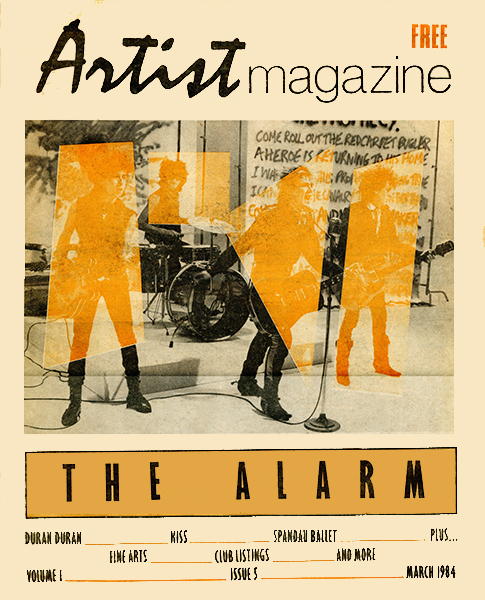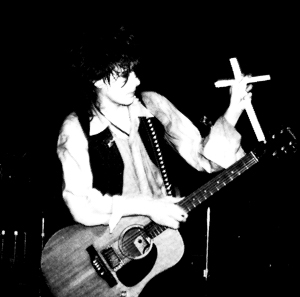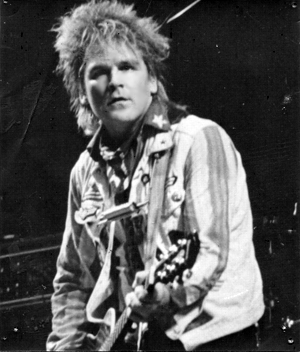
|
Search JoyZine with Google Site Search! |
The Alarm Interview by Joy Williams
Rhyl is a small town in a depressed corner of Wales. The people there are mainly working class, and many are "on the dole"—the British equivalent of Welfare. It's not easy to maintain your sense of identity, of pride in yourself, of faith in the future. The people are Celtic. Though thickly overlaid with an English cultural veneer, still they have that ancient blood running swiftly through their veins. The Celts were proud, stubborn, wild and free: creators and fighters. Sometimes, that has gone awry, as with the "orange" and "green" — Scottish and Irish — residents of Ireland. And sometimes, it has been repressed, as so often in Wales where the people were subjugated and forced into mines and slag-shaded, company-owned mining towns. But it's a funny thing about humans. Push them down long enough, and one day they rise up again. Somewhere along the line will come a few individuals with hope and vision and the ability to lead and inspire their people. That these individuals should be poet/musicians is in the grandest tradition of Celtic Druids, the culture's religious men, who were required to create inspirational songs under the harshest of conditions as the third of the five steps necessary to attaining this position of ultimate leadership.
Meet The Alarm—Mike Peters, acoustic guitar, harmonica, lead vocals; Eddie Macdonald, bass, electric and bowed guitars, vocals; Dave Sharp, acoustic and electric guitars, vocals; Nigel Twist, drums, percussion, vocals. Four young men who are impassioned, committed, and fighting back against futility and hopelessness. Bob-Dylan-Meets-The-Clash. Where did it come from, this belief in the worthiness of life, the right to fight for one's self-respect? In a lengthy conversation from Aberdeen, Scotland, where the band was on tour on the last day of January, 1984, Mike Peters tried to explain. These four young men are very close friends. Their roots go back to when the two 4-year-olds, Mike and Eddie, moved next to one another in Rhyl. Dave and Twist (as he prefers to be called) lived next to one another from the time they were 6, on Moore Lane in Manchester, England. At 15, Twist moved to Rhyl and met up with Mike and Eddie. Dave by this time was in the Merchant Marines and often visited his childhood pal in Wales. Soon, all four were friends. Eventually, Mike got his hands on a guitar and "frantically learned how to play it." He wrote his first song as a teenager, "Alarm, Alarm." A band was formed, where the foursome searched for their musical identity—but mostly kept missing it. A club was opened in Rhyl, a sort of new-wave disco "for young people, by young people," but a fight between hometowners and outsiders forced its closing. Things looked bleak, but everyone took jobs, saved up and they moved to London. A chance meeting with Kevin Rowland of Dexy's Midnight Runners got them on the bill, but after one night he told them, honestly, they sucked. The band broke up and they returned to Rhyl. But they couldn't give up, settle down, work their boring day jobs or go on the dole. The Alarm was formed.
"At one point we asked ourselves, 'Why have we dedicated our lives to music so far,?'" Mike revealed. "I realized that, for me, the writing of that song ('Alarm, Alarm') was the first thing I hadn't bought over the counter. If you're truly an artist, you start looking inside yourself for who you are. We just started reflecting on ourselves. It's a driving force that kicks people along."
And beyond that, the punk movement was critical to Mike's awakening sense of hope and faith in both himself and the future. The punk movement made him realize that he could fight back against the system. That he could be real, honest, committed, caring, and that change is possible. "I realized that I could have a future and that I could determine that future," Mike recalled of his reaction to what he found to be the positive message of the punk movement. In Britain, punk music carried the message of hope for the future, of the ability of mankind, individually and collectively, to survive with dignity, for each of us to create his own, meaningful destiny.
"I was fortunate enough to see it when it was the real thing. By the time it got to America it was distorted, just the image remained, the negative side. But punk wasn't originally about violence and hopelessness. It was disillusioning to see people (musicians) go from love for their audience to negativity. The message the bands had wasn't qualified by their attitude. "Now you're seeing the good side—Bono, for instance. It's not the punk rock that America says. It's coming around for the second time, in a way," and this time we see the positive message. Mike's musical influences are "not from groups musically, but idealistically," he avers. "I personally like music that means something—Strummer, Dylan, Aztec Camera, Big Country, the Violent Femmes, R.E.M., Dream Syndicate, U2. We still walk the same streets that prompted Dylan to write 'The Times They Are a-Changin''' and Strummer's 'White Riot.'" This makes sense, for here is undeniably one of the most idealistic bands to grace a stage since the Sixties—that most hopeful, idealistic of times, when rock'n'roll bands bore a message and people listened and felt good about themselves and the future. When there was fire and fervor, when it was right to dream about life and caring about others. This is uplifting, inspirational music: rousing, blood-stirring anthems worthy of doing battle with life by. With the Dylanesque harmonies and hopeful protest set against Twist's martial drumming, you can feel your soul marching off to battle, ready to right the world's wrongs. You can feel your inner self singing, "I believe, I believe in the future!"
"All I have to say to young people who have a burning ambition is to keep going," Mike says. |


